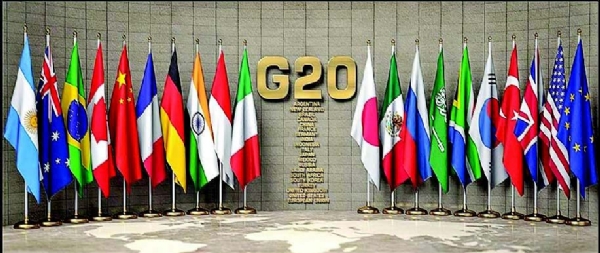G20, a Significant Platform in Shaping a More Sustainable and Prosperous Future For All
The G20 can be a powerful force in shaping a sustainable and prosperous future for all if......
Total Views |
Playing an important role in shaping and strengthening global architecture and governance on all major international economic issues, the Group of Twenty (G20), comprised of the world's largest economies, is the premier forum for international economic cooperation. Founded in 1999, it plays a vital role in being a platform for dialogue and cooperation addressing global challenges, from economic stability and trade to climate change and poverty eradication.

Financial stability
The G20 was created as a deliberative rather than decisional body, but one designed to encourage 'the formation of consensus" on international issues". So, the g20 has the potential to promote international financial stability amid this global economic crisis.
It has also taken significant steps to prevent another financial crisis, such as implementing financial regulations and fostering cooperation among central banks. Nonetheless, there are ongoing challenges and vulnerabilities in the global economy that require the G20's attention. Therefore, it should focus on strengthening international trade, fostering inclusive growth, and addressing income inequality. It should work towards reducing trade barriers and avoiding protectionist policies, which can hinder economic growth. Additionally, the G20 should prioritize investment in infrastructure, innovation, and education to foster long-term sustainable development.
Climate Action
Addressing climate change is a paramount challenge for the G20. Over the years, the group has made significant commitments to combatting global warming, such as the Paris Agreement. However, there has been mixed progress in translating promises into concrete actions. While some members have taken significant steps to reduce greenhouse gas emissions and transition towards renewable energy, others lag behind, impeding the collective efforts to mitigate climate change.
The G20 should strengthen its commitment to the Paris Agreement's goals and establish more stringent targets for emissions reduction. Furthermore, it should encourage technology transfer and financial support to help developing nations adopt sustainable practices. Collaborative efforts within the G20 should prioritize knowledge sharing and coordination to accelerate the global transition to a low-carbon economy.
Representational challenges
Let us first know who are the G20 members. The Group of Twenty (G20) comprises 19 countries (Argentina, Australia, Brazil, Canada, China, France, Germany, India, Indonesia, Italy, Japan, Republic of Korea, Mexico, Russia, Saudi Arabia, South Africa, Türkiye, United Kingdom and United States) and the European Union. The G20 members represent around 85% of the global GDP, over 75% of the global trade, and about two-thirds of the world population
Now, according to a report, a major problem of the G20 in its current configuration is that there are several ways in which it is not ‘representative’ of the global economy. First, the only African country in the G20 is South Africa, whereas there are six countries from each of the other three main regions of the world (see table 1 below). Second, not one single low-income country is included in the G20, whereas both middle-income and high-income countries are well represented, by nine and ten countries respectively.
_202306201522293527_H@@IGHT_232_W@@IDTH_454.png)
This reflects, of course, that when the countries were originally selected the intention was to create a forum for ‘systemically significant’ economies, a category to which no low-income country belongs. Today, however, after
having been elevated to a Heads of State forum which intends to be the premier forum of global economic governance, the absence of any low-income country is problematic. The same applies to the absence of small, open economies. This type of economy is perhaps the most common in the world economy, but not one small economy is included in the G20 to voice the perspectives and concerns of such economies.
Further, although the G20 has stated that the group's "economic weight and broad membership gives it a high degree of legitimacy and influence over the management of the global economy and financial system", its legitimacy has been challenged. A 2011 report for the Danish Institute for International Studies criticised the G20's exclusivity, particularly highlighting its underrepresentation of African countries and its practice of inviting observers from non-member states as a mere "concession at the margins", which does not grant the organisation representational legitimacy.
But not simply the ‘20 largest economies’
Contrary to conventional wisdom the G20 does not consist of the world’s 20 largest countries in terms of population and/or GDP. Below table gives us an overview of the world’s twenty largest countries by four different measures: GDP at market exchange rates, GDP at purchasing power parity, GDP as an average of market values and purchasing power parity; and by population.
_202306201523347384_H@@IGHT_449_W@@IDTH_413.png)
So, the other table below tells us which countries should IN and OUT if the top 20 world largest economies are considered -
_202306201524157147_H@@IGHT_217_W@@IDTH_425.png)
With this, the criteria to become a member of G20 need to be pondered upon because if the lone African country is removed, African countries already do not feel represented by South Africa.
The G20 can be a powerful force in shaping a sustainable and prosperous future for all if it capitalizes on its platform and leverages the expertise and resources of member nations. By addressing the evaluation's findings and embracing a holistic approach, the G20 can lead the global community toward more inclusive, resilient, and environmentally conscious world.

